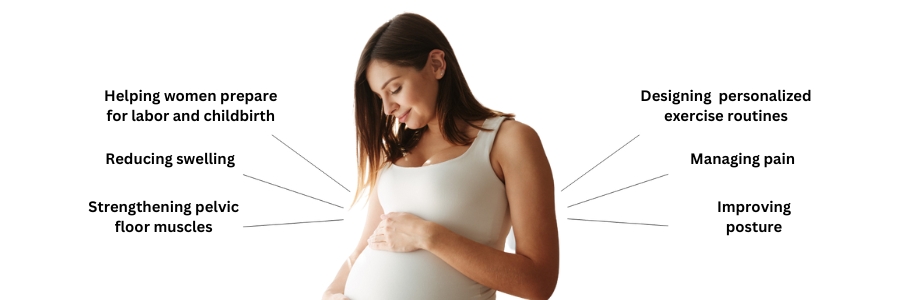
Expecting a Bundle of Joy? Stay Fit on the Journey
Pregnancy comes with a price – especially the prenatal stage – morning sickness, relentless back pain, and persistent fatigue! We understand!
The prenatal stage is a crucial and transformative period in a woman’s life. While pregnancy is a beautiful and miraculous experience, it can also bring about various challenges and health issues for women. It’s essential to understand these potential problems to ensure the well-being of both the mother and the developing baby.
Let us help relieve these challenges while you focus on your bundle of happiness. Access physiotherapy for pregnancy.
Embrace Motherhood. Manage Prenatal Symptoms
Back Pain
Discomfort and pain in the lower back as the baby grows and shifts the body’s center of gravity
Back & Pelvic Pain
Nausea and vomiting, often occurring in the morning but can happen at any time of the day
Fatigue
Feeling unusually tired and lethargic due to the increased energy demands of pregnancy
Frequent Urination
Increased trips to the restroom due to the growing uterus putting pressure on the bladder
Food Cravings
Sudden desires for specific foods and aversions to certain smells or tastes
Swollen Feet and Ankles
Edema or swelling in the feet and ankles caused by increased fluid retention
Mood Swings
Emotional ups and downs due to hormonal fluctuations
Breast Changes
Tenderness, enlargement, and darkening of the nipples as the body prepares for breastfeeding
What causes prenatal symptoms?
Pregnancy symptoms including morning sickness, exhaustion, back discomfort, and food cravings are brought on by hormonal changes. Frequent urination and swelling feet might be brought on by a developing uterus. Mood changes are also typical. For a more comfortable pregnancy, good self-care and medical assistance can help control these symptoms.
Physiotherapy for pregnancy helps in the prenatal stage by

FAQs related to Prenatal Pregnancy
What are the early signs and symptoms of pregnancy?
Missed periods, nausea, breast soreness, exhaustion, and frequent urination are some of the early indications of pregnancy. Additionally, some women may develop food cravings and mood fluctuations. It is advised to use a home pregnancy test or speak with a healthcare professional if you think you might be pregnant.
Is it safe to exercise during pregnancy?
While exercising while pregnant is generally safe, it is imperative to speak with a healthcare professional beforehand. Walking, swimming, and prenatal yoga are all low-impact exercises that are frequently advised. Avoid contact or high-impact sports, pay attention to your body, and adjust your workouts as necessary. Physiotherapist will chalk out a customized exercise and wellness plan as per your specific needs.
What foods should I avoid during pregnancy?
Avoid raw or undercooked meats, unpasteurized dairy products, some fish high in mercury, raw eggs, and deli meats to maintain a safe pregnancy. Select a diet that is well-balanced and full of fresh produce, healthy grains, and lean proteins.
How can I manage morning sickness?
Eat little, frequent meals, remain hydrated, and stay away from oily or spicy foods to control morning sickness. Acupressure bands, prenatal vitamin supplements, and ginger-based therapies can also be beneficial. Get your physiotherapist’s help to plan out a routine to treat morning sickness.
Can I travel during pregnancy?
In the early and middle weeks of pregnancy, traveling is normally safe, but speak with your doctor first, especially if you are having any issues or are getting close to your due date. Drink plenty of water, stop frequently, and dress comfortably when traveling.
How can I cope with pregnancy mood swings and emotions?
Self-care, maintaining relationships with loved ones, practicing relaxation methods like meditation or deep breathing, and, if necessary, obtaining assistance from medical professionals or support groups are all important components of coping with mood swings.
How does physiotherapy prepare the body for labor and delivery?
Physiotherapy for pregnancy is an excellent solution to cope with challenges and prepare the body for labor and delivery. It uses pelvic floor exercises, flexibility training, and breathing techniques that encourage relaxation and optimal positioning for birthing.
Are there any specific sleeping positions recommended during pregnancy?
During pregnancy, sleeping on your left side is frequently advised as it promotes blood flow to the unborn child and eases pressure on the liver and inferior vena cava.
How can I manage pelvic pain and discomfort during pregnancy?
Exercises to strengthen and stabilize the pelvic region are available during physiotherapy, which can relieve pelvic pain and discomfort.
How does physiotherapy prepare the body for labor and delivery?
Physiotherapy for pregnancy is an excellent solution to cope with challenges and prepare the body for labor and delivery. It uses pelvic floor exercises, flexibility training, and breathing techniques that encourage relaxation and optimal positioning for birthing.
How can physiotherapy help with pregnancy-related back pain?
Physiotherapy uses therapeutic stretches, exercises, and manual methods to ease stress and enhance posture to treat back discomfort brought on by pregnancy.
Is it safe to undergo physiotherapy treatments during pregnancy?
When performed by a trained expert, physiotherapy is generally safe during pregnancy. In order to guarantee that the right techniques are used, let the physiotherapist know you are pregnant.
What benefits can I expect from physiotherapy for pregnancy in prenatal stage sessions?
The benefits of prenatal physiotherapy throughout pregnancy include increased pelvic health, decreased discomfort, better labor preparation, and improved general physical well-being.
Are there any precautions to follow during physiotherapy treatments while pregnant?
It’s important for the physiotherapist to use gentle approaches, avoid certain pressure spots, and make sure that exercises and motions are suitable for pregnancy throughout treatment sessions.






